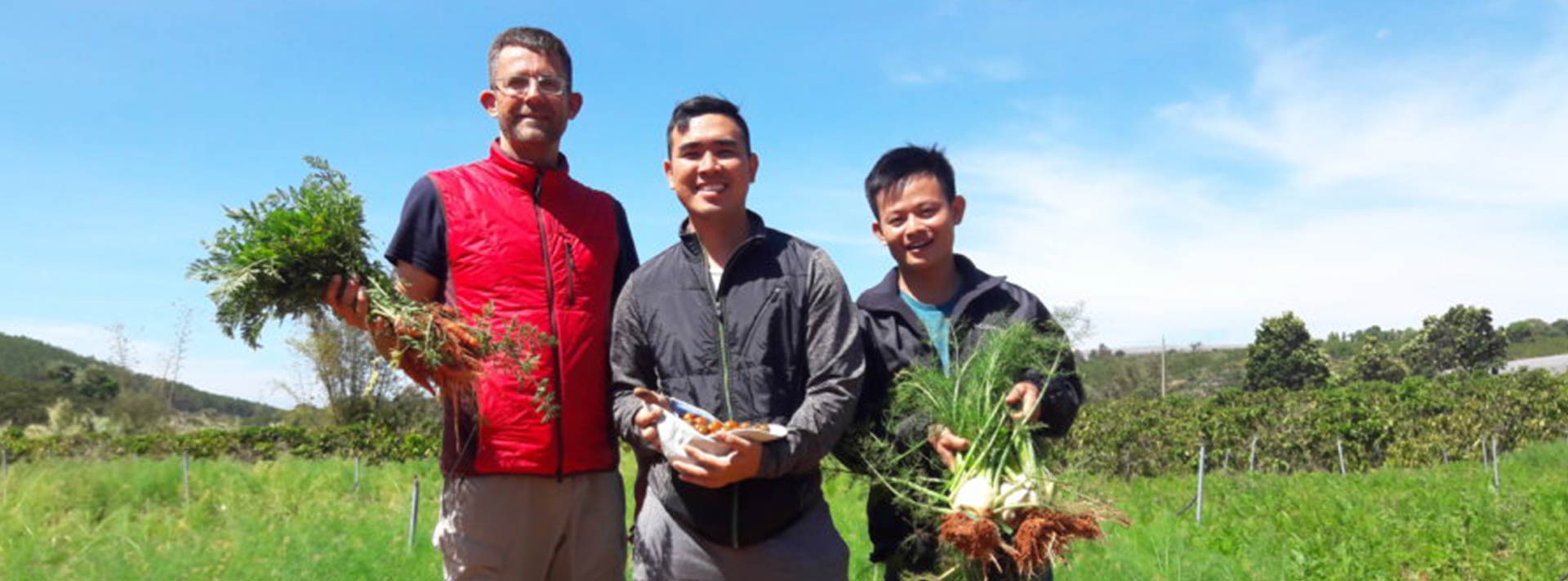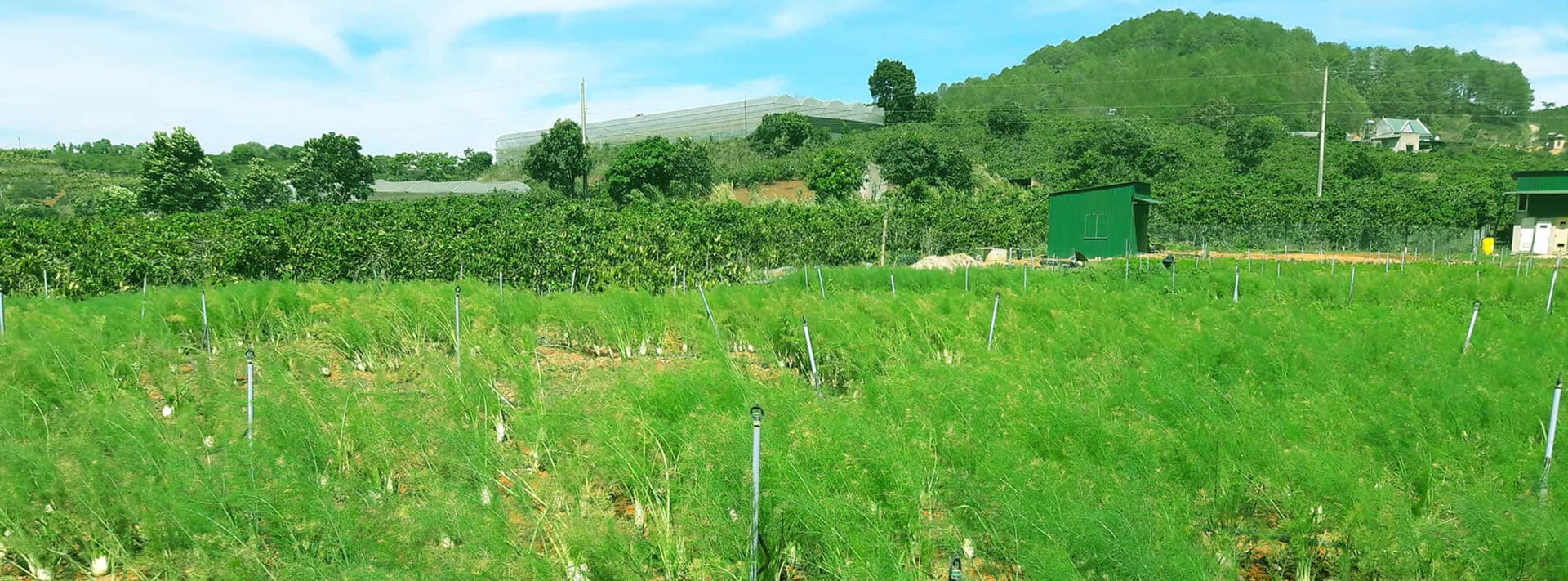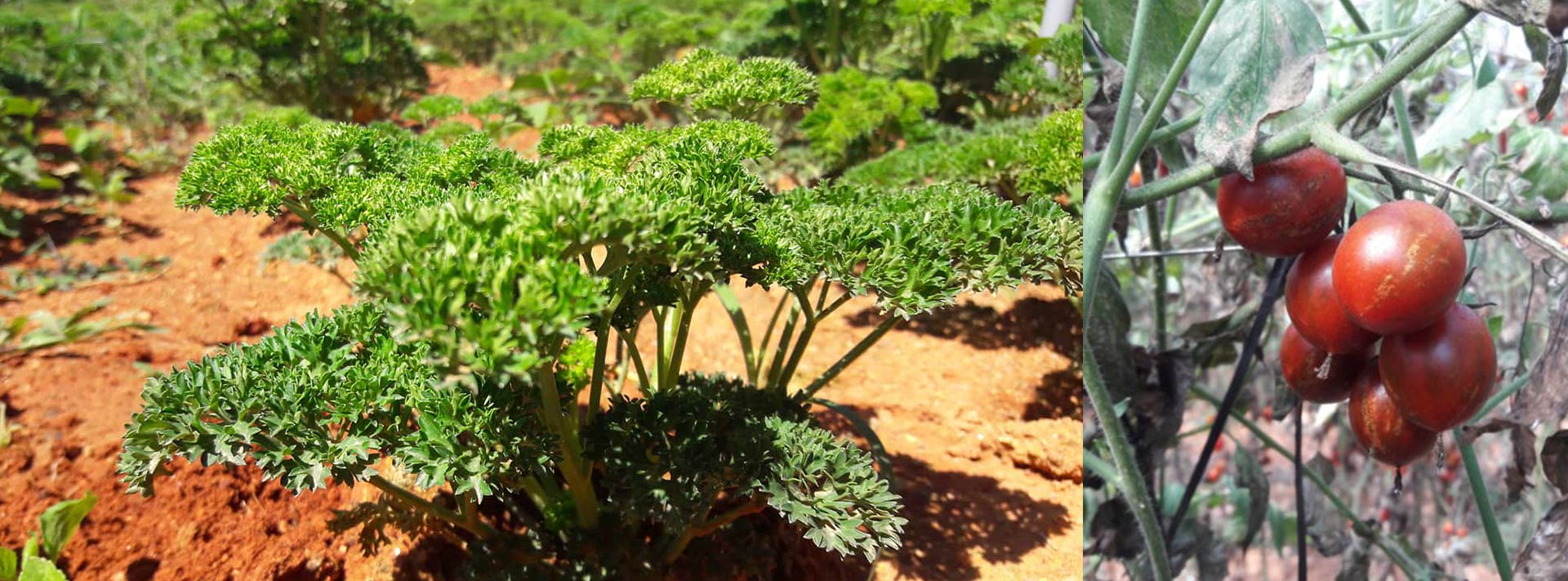Guests of our healthy living & fasting retreats often want to get recommendations where they can buy clean, safe and ideally, organic food. To recommend producers, suppliers or retailers we always sample their products or services first to ensure we can confidently support any endorsements.
On 7 April, we paid a visit to Uncle Ri’s farm near Dalat owned by Nguyễn Ri Mi Phong (Ri) and his wife Phạm Hồng Ngọc. We first heard about the farm through a post on Facebook where they offered their produce and as a result we ordered organic fennel, baby carrots, curly parsley and kale for our juices.
Dieter & Hoan from Vietnam Detox and “Uncle” Ri from Uncle Ri’s farm.
The quality and taste of what we had ordered was fantastic so we wanted to know more about the products, how they are produced and the people behind the farm. So we accepted an invitation by Ri and his wife Ngoc to visit their farm last Saturday.
The farm is located in Tà Nung, 15 km west of Da Lat, near the famous Me Linh Coffee Garden which attracts thousands of visitors every day for coffee and selfies.
Initially Ri studied Information Technology, but after 2 years he experienced a life threatening health challenge, with Doctors almost giving up on him. He overcame his condition, and mediation played a big role in his recovery. After feeling better, he decided to change his area of studies and began studying Agricultural Engineering at Dalat University. One of his teachers there was Dr. Hung Nguyen Ba, who has achieved fame for pioneering organic farming in Vietnam and has set up organic farms, achieving European Union BIO certification.
After graduating in 2010, Ri worked in several agricultural businesses including Da Lat GAP (engineering), Da Lat Hasfarm (engineering), Metro Cash and Carry (agronomist) and VinEco from Vingroup (Farm manager) before being able to realise his dream – setting up his own organic farm.
So, just over a year ago, Ri and his wife bought 1 hectare of land in a quiet valley. To ensure they can start with high quality soil, they transferred a 1 meter thick layer of nutrient rich soil from a hillside nearby. Determined to avoid the use of all artificial substances to make their crops grow, they used cow manure as fertiliser, and until this moment, had no need to use pesticides to control insects or snails or fungicides. They employ a number of farm helpers to collect the harvest and to monitor and remove weeds and any pests before they get hold of the plants.
One of the things which intrigued us was the fact that the played music to their plants. Ngoc explained, after reading a book by Japanese Professor Masaru Emoto about the impact of positive thoughts and sounds on water and plants, she decided to play “Om Padme Hum” to all their plants. The results are very encouraging as the exposure to the gentle tunes help the plants to grow better.
At the time of our visit, Ri grew fennel, curly parsley and Japanese baby carrots. We went across an adjacent fallow field into a green house, operated by a neighbour. In here, chocolate cherry tomatoes were grown and ready to be harvested. The neighbour uses VIET GAP (Good Agricultural Practices) which is a healthier form of farming using less chemicals compared with conventional farming methods, however, there is still moderate use of fertiliser, pesticides and herbicides. The taste of the cherry tomatoes was amazing, sweet and full of intense flavour. Of course, there remains a risk of cross contamination from non organic agricultural land nearby. What could theoretically happen is that the chemicals used by other farmers could seep into Ri’s land and contaminate the soil. That is the reason why he added a full meter of soil on the land and dug up his own 30 meter deep well to access the ground water which is not contaminated.
Organic farming is still in its infancy in Vietnam and farmers who are just starting, find it difficult to reach the markets which could buy their products. Of course, orders from individuals are a starting point, but in order to sustain business, guaranteed regular uptake of their produce is critical. The tasty cherry tomatoes for example were rotting away as there were not buyers for them.
Orders are handled via their facebook page. Ngoc deals with the commercial aspects of the farm. Just like their page, and you can get daily updates on the latest produce on offer.
In the future, Ri and Ngoc want to rent neighbouring plots or even buy them, but the cost of land near Dalat has exploded and a hectare of agricultural land has gone up from 1 to 5 billion Dong. Although the vegetables on Ry’s land are grown without the use of chemicals, organic certification is still a long way away as the process and criteria are lengthy and very expensive to obtain. Adding land and getting certified are goals they want to achieve in the future, in the meantime they are happy if people appreciate their efforts to provide healthy food and order the great vegetables they produce.
Following our visit, we feel confident and proud to add Uncle Ri’s farm to our list of partners. We will be happy to include produce from Ri’s farm to prepare the healthy juices, soups and salads offered during our retreats, workshops and hikes.
We hope restaurants and hotels in Dalat as well as individual households will try out Uncle Ri’s farm products and enjoy the great taste. The farm now also starts to deliver their produce to Ho Chi Minh City via bus service. With next day delivery, this could become an easy way to benefit from organic fresh and healthy vegetables from Dalat.
We are also planning to organise workshops, with Ri explaining what organic farming is, how if differs from conventional farming and how choosing organic produce can benefit your and your family’s health.
Often people are very price sensitive when it comes to their food. Of course, you can buy these products for less money on your local market. However, the confidence consuming safe and healthy food can give you is priceless. With the increase of chronic diseases associated with lifestyle choices, environmental pollution, and the overuse of chemicals in the growing of fruits, vegetables and herbs, eating safe food is one way of increasing your chances of living a long and healthy life.
From a global perspective, organic farming represents only 1 percent of the total agricultural space worldwide. With the ongoing merger of large agrochemical conglomerates such as Bayer/Monsanto, Syngenta and Dow Chemical/Dupont, all seeds and the food of the world will be in the hand of just 3 or 4 companies who decide which plants we are allowed to grow and to eat. Supporting organic farmers is a step in the right direction of lessening the impact of these dangerous monopolies.


